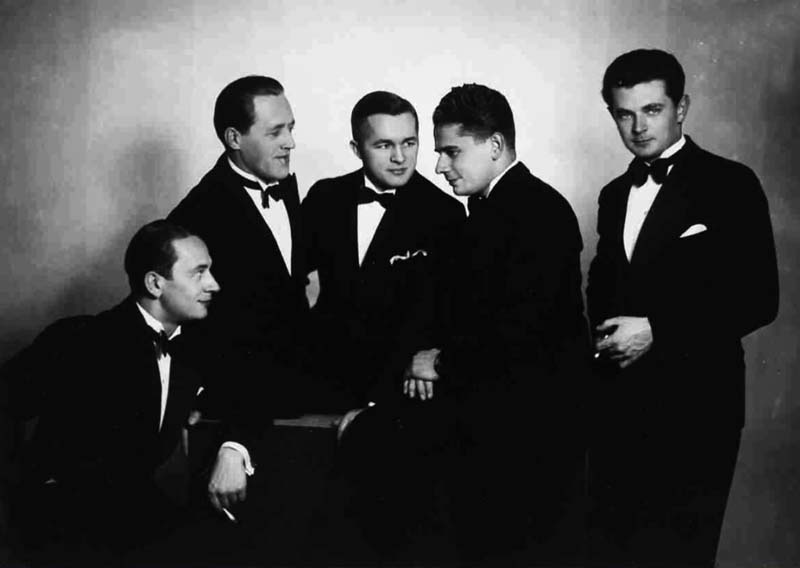He was born Mieczysław Fogiel on 30th May, 1901 in Warsaw, and he passed away in the same city on 3rd September, 1990. Always loyal to his native city, Fogg was popular with several generations of listeners in Poland and abroad. He performed famous tangos in a unique way and reached people’s hearts with his songs about love. His best known hits were the Tango Milonga, To Ostatnia Niedziela (This Is the Last Sunday), Jesienne Róże (Autumn Roses), Mały Biały Domek (Little White House), Już Nigdy (Never Again), Pieśń O Matce (A Song About the Mother).
‘I Remember the Days’
Mieczysław’s mother was a storekeeper and his father was a driver for a railway company. Fogg attended a technical secondary school on Jezuicka Street. In 1910, he joined the Polish scouts. As he entered adulthood, he enlisted in the Polish Army (1919-1921) and took part in the Polish-Soviet War of 1920.
In 1922, Fogg began working in the Warsaw Directorate of the Polish State Railways, a form of making amends to the ambitions of his father, who wanted him to pursue a career in engineering, transportation and road-building. From his early years, however, Fogg wanted to devote his life to music, and maintained a belief in his talent. Initially, he sang in church choirs, where he was noticed by Ludwik Sempoliński, who told him he should seriously consider an education in singing and sent him to Jan Łysakowski, a professor at the Department of Vocal Sciences of the Fryderyk Chopin Music School in Warsaw. Fogg’s ambition and talent were supplemented by hours of meticulous study: note reading, diaphragm exercises, back to note reading, and so on. His next musical mentors included Eugeniusz Mossakowski (1926-28), Michał Ardatti (1928-29), Anna Floriani-Zbierzchowska, Wacław Brzeziński, Ignacy Dygas, Stefan Belina-Skupiewski, Stanisław Kopf, and Adam Didur. Fogg began to earn money by singing at weddings and funerals, but, since the money did not cover the costs of his education entirely, he also had to moonlight as a claqueur at the opera.
In 1926, Mieczysław Fogiel adopted his stage name, Fogg. He debuted as a soloist with a number of opera arias on 10th December, 1928, in the concert hall on 14 Kredytowa St. In the same year, he became a member of Dan’s Choir, named after Władysław Daniłowski, the leader of the group. The quintet, hiding behind the Spanish-sounding name Coro Argentino V. Dano, debuted on 29th March, 1929 in the legendary Warsaw cabaret theatre, Qui Pro Quo. The members of Dan’s Choir later sang folk songs from the Tatra mountains and the Łowicz region in jazz arrangements. Fogg recalled:
After one of our shows, a man with a benevolent smile visited us in the backstage. ‘I really liked your jazz versions of the folk songs’, he said with admiration. The man’s name was Karol Szymanowski.
‘To Be Young, And Nothing More’
 Dan’s Choir . From left: Mieczysław Fogg, Tadeusz Bogdanowicz, Wincenty Nowakowski, Władysław Daniłowski, Adam Wysocki, 1932, photo by Jerzy Benedykt Dorys / Polona - The National Digital Library
Dan’s Choir . From left: Mieczysław Fogg, Tadeusz Bogdanowicz, Wincenty Nowakowski, Władysław Daniłowski, Adam Wysocki, 1932, photo by Jerzy Benedykt Dorys / Polona - The National Digital LibraryFogg’s first albums with Dan’s Choir were recorded in July 1929, and his solo albums followed in March 1930. He toured with the choir in Estonia, Latvia, the USSR, Finland, Sweden, Norway, Austria, Czechoslovakia, Romania, France, and Italy. He received a wealth of offers. When the troupe were on their way to the United States aboard the Ile de France, a ‘duel’ ensued with one of the best US groups, the Mills Brothers. Dan’s Choir won 3:1 in encores.
In 1931, Fogg took part in music radio shows organised by the Gebethner and Wolff publishing house and began to give radio recitals. He performed on stage with Stanisław Nawrot’s orchestra, to the accompaniment of Ludwik Urstein. Fogg stayed with Qui Pro Quo until 1933 and later associated with other theatres and revues. He finally left Dan’s Choir and redirected his efforts into his solo career, recording up to 150 songs in a year. He later recalled:
In the 1930s, I signed contracts for a hundred songs per year. I exceeded that limit by fifty and earned the nickname, ‘worker ant’.
He collaborated with famous cabaret artists, both on stage and in recordings: he worked with Hanka Ordonówna, Stefcia Górska, Zula Pogorzelska, and Adolf Dymsza. He also set a record in prewar music sales with his To ostatnia niedziela album, which sold in more than 100,000 copies.
In 1937, Fogg won in a country-wide vote of the Polish Radio listeners for the most popular singer, gathering almost 50,000 votes (out of the 150,000 cast in total).
He opened his two-week tour in the United States with a performance in New York on 12th October, 1938, and went on to sing in the Rivoli theatre in Buffalo, NY, and the Congress theatre in Chicago, as well as Detroit, Cleveland, Boston, and Philadelphia. He also recorded an album for the famous record company RCA Victor.
Fogg was the first Polish artist to perform live on TV when he sang in London in 1939 in a British TV studio.